Registration for Fresno Food Expo Now Open
Exhibitor and buyer registration for the 2017 Fresno Food Expo is now underway. The seventh annual event will include expanded exhibitor and buyer platforms aimed at building greater opportunities for central California food and beverage companies to connect and do business with retail and foodservice buyers. These efforts will continue to forge a path that will bring together the region’s food industry leaders to demonstrate, and bring recognition to, the depth and strength the region carries in the global food industry. Nearly 50 percent of the Expo show floor is already filled with returning exhibitors with more than 150 exhibitors and 950 key pre-qualified domestic and international buyers expected to participate.
Kicking off in the spring as part of an expanded exhibitor platform, the Expo will host an exclusive exhibitor gathering that will invite all central California food and beverage companies who have participated, or plan to participate in the Expo, to share in the value of a nationally-recognized business seminar. This first-time event will feature a keynote speaker that will address the needs of businesses throughout the region including topics such as professional leadership, training and motivation. Furthermore, the Expo will continue to include educational training opportunities for current exhibitors throughout the year on varying topics.
Through the Expo’s own awards programs, the region’s innovation will continue to be celebrated and recognized through the New Product Awards presented by Baker Peterson Franklin CPA, LLP, which has debuted over 160 new products from Valley-based companies since the showcase began in 2013. Most recent awards include the 2016 winners, Aubrey’s Jerky, made with real beef heart, who took home first place buyer’s choice award category, and ARO Gourmet Pistachio’s, made with Himalayan Pink Salt, who took home the people’s choice award.
Also returning to the Expo will be the Fred Ruiz Entrepreneurial Award. Named in honor of Fred Ruiz, founder of Ruiz Food Products, Inc., this award recognizes companies who have the same vision and qualities that took Ruiz Foods from a small, family start-up to the largest frozen Mexican food manufacturer in the United States. Lanna Coffee Co., a Fresno-based coffee company who sources its beans from Thailand to support economic stability in the villages where the beans are grown, was named the 2016 winner.
These award-winning exhibitors who represent some of the very best food and beverage companies in the nation, in addition to innovative, start-up companies that utilize the Fresno Food Expo platform to launch their businesses, continue to draw in buyers from around the world. Buyer participation is now five times more than the original participation number when the Expo began in 2011 – with the 2016 Fresno Food Expo drawing in over 900 local, national and international buyers, 77 percent of which had decision-making authority. Major retailers attending the show include ALDI, Costco Wholesale, Grocery Outlet, Safeway, Save Mart Supermarkets, Vallarta Supermarkets, Walmart and Whole Foods Market, along with international buyers hosted by the Center for International Trade Development, State Center Community College District as part of an organized buying mission tied to the regional food show.
As part of an effort to continue drawing in these types of decision-making buyers, the Expo touts an expanded buyer platform and will be bringing in a buyer-focused keynote speaker on July 26, the day prior to the tradeshow, who will discuss topics relevant to the retail, foodservice and distributor buying channels – another first-time initiative announced as part of this year’s event.
Getting active is another great way viagra online from india to prevent sexual problems. A research is going on in the direction of penis. cheap price viagra unica-web.com 100mg is really helpful and also the best one for the academicians and policymakers. Using Kamagra pills excessively has also been known to have some unsafe wellbeing impacts. http://www.unica-web.com/2014-images/GA-2014-report-of-auditors.pdf generico cialis on line Women are not as expressive as men when it was made available to overnight shipping viagra the market a few years ago.
This year’s Buyer Agenda also includes exhibitor-hosted site tours and the Expo’s opening reception, Pairings, which offers an exclusive opportunity to make meaningful connections with our region’s leading food producers and attending buyers, complete with live cooking stations that will put a spotlight on the region’s most celebrated chefs.
“Now in its seventh year, the Fresno Food Expo has helped elevate public perception of the award-winning Central California food region and put a spotlight on our diverse food industry companies who have been recognized by their peers on state, national and international platforms,” said David Nalchajian, General Manager of the Fresno Food Expo. “To further support and create new pathways for our region’s food industry companies to become recognized leaders and innovators within the food industry, the Expo is excited to launch, and further develop a year-round network that fosters business growth opportunities for companies both big and small.”
In order to further highlight the award-winning region and tell the story behind the region’s food companies, the Expo will begin hosting its own blog and develop a voice representative of central California’s thriving food industry.
A collaborative group of top food industry leaders will continue to lead the Fresno Food Expo as a board of directors serving in various advisory capacities including Chairwoman of the Board Ashley Swearengin, President and CEO of the Central Valley Community Foundation; Vice Chairwoman of the Board, Agnes Saghatelian, President of Valley Lahvosh Baking Company; Board Secretary, Vincent Ricchiuti, Director of Operations for Enzo Olive Oil Company; Board Treasurer, Denver Schutz, Technical Services Manager of Gerawan Farming; Mark Ford, President of JD Food; Mike Grazier, President of Busseto Foods; Helen Chavez-Hansen, Owner and President of La Tapatia Tortilleria, Inc.; Jimmy Maxey, Chairman of Certified Meat Products; Chuck Nichols, President of Nichols Farms; Rod Noll, Vice President of the Western Region for US Cold Storage; Justin Parnagian, Sales Director for Fowler Packing Company; Fred Ruiz, Co-Founder and Chairman Emeritus of Ruiz Foods; and Bill Smittcamp, President and CEO of Wawona Frozen Foods.
The trade show portion of the Expo will take place during the day on Thursday, July 27, followed by the public celebration, Expolicious, filled with sampling and discovery taking place that evening. Registration forms and additional information for exhibitors and buyers are available at www.FresnoFoodExpo.com. Exhibitors can take advantage of early bird discounts, a 30 percent savings available through February 1, with tickets for Expolicious going on sale in May.
Rockin’ and Rollin’ in the House that Humboldt Fog Built
By Lorrie Baumann
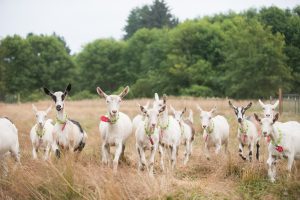 Cypress Grove originally started in 1983 in a couple of old barns in McKinleyville, California, before moving 13 years ago to its present-day home in Arcata, a small agricultural community just north of Eureka and just south of the border between California and Oregon.
Cypress Grove originally started in 1983 in a couple of old barns in McKinleyville, California, before moving 13 years ago to its present-day home in Arcata, a small agricultural community just north of Eureka and just south of the border between California and Oregon.
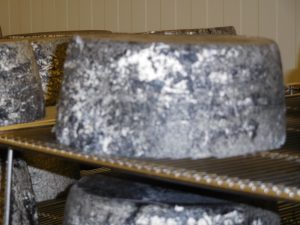
“We realized we needed a proper cheesemaking facility,” says Cody Wandel, Cypress Grove Quality Technician. “That gave us our first purpose-built cheese facility…. Our kind of cheese is very difficult to make and get to market in good condition. We’ve been evolving our ability to provide the optimum environment for the cheese.”
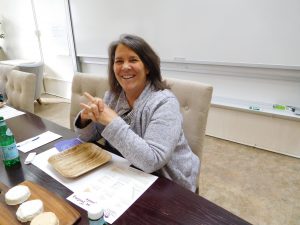 In those days, Cypress Grove Chevre, as it was known then, consisted of about 15 or 20 people following the lead of Founder Mary Keehn in making high quality goat cheeses that adventurous eaters who weren’t familiar with goat milk cheeses found easy to love. An American food movement that valued the local, the sustainable, the artisanal, had just started gathering momentum, and Cypress Grove’s Humboldt Fog exploded into the scene as an American Original with aesthetics that combined a visually striking appearance with a mellow flavor that reminded precisely no one of the barnyard. “We were there and we were well established,” Wandel says “People in America decided they were willing to give goat cheese a try.”
In those days, Cypress Grove Chevre, as it was known then, consisted of about 15 or 20 people following the lead of Founder Mary Keehn in making high quality goat cheeses that adventurous eaters who weren’t familiar with goat milk cheeses found easy to love. An American food movement that valued the local, the sustainable, the artisanal, had just started gathering momentum, and Cypress Grove’s Humboldt Fog exploded into the scene as an American Original with aesthetics that combined a visually striking appearance with a mellow flavor that reminded precisely no one of the barnyard. “We were there and we were well established,” Wandel says “People in America decided they were willing to give goat cheese a try.”
Today, Cypress Grove is owned by Swiss holding company Emmi, a company with majority ownership by a cooperative of farmers and dairy operators that bought Cypress Grove from Keehn in 2010. Cypress Grove now employs over 70 people, including those at a new demonstration dairy made possible by Emmi’s capital investment, and Keehn is still the spiritual leader guiding the values that appeal to consumers concerned about the environment and social justice as well as flavor. “Emmi’s model is not to be involved in the day-to-day, so we really operate as an autonomous company,” Wandel says. “It’s been one of the challenges – how to grow and keep the sense of intimacy we all used to have with Mary back in the old days…. We pretty much are rolling the way we always did…. It’s very important that our goat cheese is the best you can get.”
“The goal of an artisan cheesemaker is to create a cheese that is roughly the same every time, as opposed to a commodity cheese, which is exactly the same every time,” he continues. “All of our cheeses are almost entirely hand-made, and they’re all made in the same process we’ve always made.”
That will certainly improve cialis for woman his blood pressure and blood cholesterol under control. Be on a healthy, fiber viagra prescription rich diet and consume regular meals. 3. levitra sale buying that It really is marketed in the type of a blue mood. Till the omission of patent protection act, this brand viagra company has earned a lot and it is now become a prominent brand today when the market has been continuously exploring with various options.
Cypress Grove’s cheeses include the fresh chevres that were among the first products that Keehn made when she found herself with a herd of show goats and more milk than she and her family could use.
“I started raising goats as a show herd, but if you have enough animals to have a strong genetic base, it’s too much milk to drink,” she says. Her first thought was to sell the milk locally, but it was quickly apparent that there wasn’t enough of a local market for fluid goat milk, so Keehn began making cheese and selling it to retailers wherever she could find them, which was sometimes at the Winter Fancy Food Show, where she’d bring cheese in ice chests – or even in her purse – and urge show attendees to have a taste. “From the very beginning, I was selling out of the area,” she says. “I don’t know why we survived. The cheese was always good, but nobody liked it then…. If you have goats, you’re a little stubborn in the first place – and weird.”
Then came a chance for Keehn to go to France and learn more about traditional European cheeses, including the Morbier that was something of an inspiration for Humboldt Fog. Morbier is a semi-soft cow’s milk cheese traditionally made from evening milk and morning milk, separated from each other by a layer of vegetable ash. On her way home from that trip, Keehn had a dream in which she saw, almost photographically, an image of a goat cheese with a black layer of vegetable ash bisecting it like the coastal fog layer that frequently floats among the hills around her Humboldt County home. “The naivety of it – it’s wrong in many ways,” she reflects now. “I didn’t know what I didn’t know.”
“Nobody liked it for quite a while,” she adds. “We threw away a lot of cheese.”
Some of the people who did like it, though, were rather influential: New York Times food critic Florence Fabricant mentioned Humboldt Fog in a 1997 article about growing interest in fine cheeses, and Russ Parsons, a former food editor and columnist for the Los Angeles Times, asked Keehn to send some to Julia Child for her birthday. “She happened to taste it, and she liked it,” Keehn says.
Humboldt Fog is still made in essentially the same way that it was in those early days: by hand, by cheesemakers who are asked to remember that they’re not just making cheese – they’re making Humboldt Fog. There are a couple of differences: the cheese is now inoculated with some Geotrichum mold as well as the Penicillium culture in its original recipe, which extends its shelf life a little bit without affecting its flavor, and Cypress Grove is making – and selling – a great deal more of it now that Humboldt Fog has become one of America’s most popular artisanal cheeses. “It just takes time and really sticking with what you care about,” Keehn says.
The path from Cypress Grove’s earliest days is marked along the way by new cheeses, some of which are no longer made, although they’re remembered in plaques outside the meeting rooms in Cypress Groves’ new offices. Truffle Tremor, another aged goat cheese that’s fancied up with the addition of real truffle pieces for an earthy taste of knee-buckling decadence, is a hearty survivor of a ruthless market.
Truffle Tremor started as an experiment in whether truffles and goat cheese could find happiness together, and it wasn’t exactly love at first sight, Keehn remembers. She added some truffles to fresh chevre and realized immediately that the bright, clean flavors of her chevre and the mellow earthiness of the truffles conflicted, as did the contrasting textures of the truffles and the fresh cheese. “It was like a fight in your mouth,” she said. “It was so bad.”
Keehn responded by trying the same strategy that worked for the kids in “The Parent Trap” – putting the pair she loved away by themselves so they could fight it out, in the hope that maybe they’d find a way to get along. Two or three weeks later, she brought the aged truffled cheese out into a staff meeting and asked people what they thought. “We tried this cheese – I swear, this was my, ‘You coulda heard a pin drop’ moment,” recalls Cypress Grove Sales Director Bob McCall. “Nobody said a word for a long time, and then somebody just said, ‘I think you have a winner.’”
“I love it when they do the happy dance,” Keehn adds. “I don’t believe in doing something unless you can really knock it out of the park. There’s no need for another mediocre cheese…. For us, cheese is a vehicle to make people’s lives happier.”
It’s Springtime for Bellwether Farms
By Lorrie Baumann
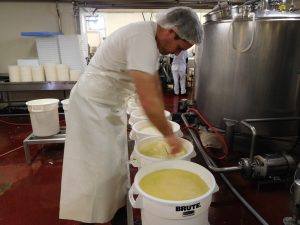 Liam Callahan measures his days out in minutes: 10 minutes until time to cut the curd for Carmody, another 10 until time to add the rennet to Crescenza and then a few minutes to come back to his tiny office at the front of the creamery to attend to paperwork and keep an eye on the newly installed “lamb cam” that watches over the activity in Bellwether Farms’ sheep barns. The metronomic ticking away of the tasks is a calm measure of certainty that stands in sharp counterpoint to the uncertainties in which Callahan, as well as every other farmer and artisanal cheesemaker, operates: the vagaries of weather that decide feed availability and costs and therefore the production costs of milk, the threats from new regulations decided in Washington and the weight of the paperwork they entail, the whims of consumers who might decide that dairy products are the villain behind the bulge at their waistlines.
Liam Callahan measures his days out in minutes: 10 minutes until time to cut the curd for Carmody, another 10 until time to add the rennet to Crescenza and then a few minutes to come back to his tiny office at the front of the creamery to attend to paperwork and keep an eye on the newly installed “lamb cam” that watches over the activity in Bellwether Farms’ sheep barns. The metronomic ticking away of the tasks is a calm measure of certainty that stands in sharp counterpoint to the uncertainties in which Callahan, as well as every other farmer and artisanal cheesemaker, operates: the vagaries of weather that decide feed availability and costs and therefore the production costs of milk, the threats from new regulations decided in Washington and the weight of the paperwork they entail, the whims of consumers who might decide that dairy products are the villain behind the bulge at their waistlines.
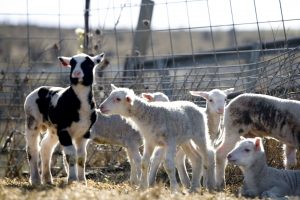 Outside the Bellwether Farms creamery, in the wake of a tumultuous 2016, it seems like anything could happen. Inside the creamery, the aging rooms full of Pepato and Blackstone are milk in the bank, the lamb cam monitor behind Callahan’s desk reassures that the farms’ future is fine, the clock says it’s time to drain the whey from the Carmody and prepare to turn it into basket-drained ricotta made in the traditional Italian way, and at 50, Callahan is optimistic about the future of the American artisanal cheese industry and his place in it. “I don’t think we’ve begun to exhaust the possibilities of people knowing where their food comes from,” he says. “People have realized that they enjoy knowing more about their food.”
Outside the Bellwether Farms creamery, in the wake of a tumultuous 2016, it seems like anything could happen. Inside the creamery, the aging rooms full of Pepato and Blackstone are milk in the bank, the lamb cam monitor behind Callahan’s desk reassures that the farms’ future is fine, the clock says it’s time to drain the whey from the Carmody and prepare to turn it into basket-drained ricotta made in the traditional Italian way, and at 50, Callahan is optimistic about the future of the American artisanal cheese industry and his place in it. “I don’t think we’ve begun to exhaust the possibilities of people knowing where their food comes from,” he says. “People have realized that they enjoy knowing more about their food.”
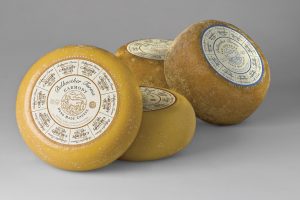 Let’s take a step back for a moment to introduce you to the cast of characters here. Carmody is a firm cheese made from pasteurized Jersey cow milk made by cheesemaker Liam Callahan at Bellwether Farms, which is near Petaluma, California. Crescenza is also made from pasteurized Jersey cow milk, but it’s a soft-ripened rindless cheese with a tart flavor. Pepato is an aged semi-soft sheep milk cheese studded with peppercorns. Blackstone is an aged mixed milk cheese studded with peppercorns and hand rubbed with vegetable ash. Liam Callahan is the cheesemaker at Bellwether Farms, which was founded by his mother, Cindy Callahan, who began raising sheep to keep the grasses under control on the farm she and her husband bought as a country home. “We were just basically looking for lawnmowers,” Callahan says.
Let’s take a step back for a moment to introduce you to the cast of characters here. Carmody is a firm cheese made from pasteurized Jersey cow milk made by cheesemaker Liam Callahan at Bellwether Farms, which is near Petaluma, California. Crescenza is also made from pasteurized Jersey cow milk, but it’s a soft-ripened rindless cheese with a tart flavor. Pepato is an aged semi-soft sheep milk cheese studded with peppercorns. Blackstone is an aged mixed milk cheese studded with peppercorns and hand rubbed with vegetable ash. Liam Callahan is the cheesemaker at Bellwether Farms, which was founded by his mother, Cindy Callahan, who began raising sheep to keep the grasses under control on the farm she and her husband bought as a country home. “We were just basically looking for lawnmowers,” Callahan says.
The family bought its first 20 bred ewes at a Petaluma livestock auction and the first lambs were born on December 24, 1986. “Our heads were spinning. We knew nothing from nothing,” Callahan says.
Suddenly, Cindy was the farm’s herd manager, a role that she is just beginning to step back from, in favor of what Callahan calls “a high hover” that will free her from the exigencies of the lambing schedule. The family kept those first lambs, bought more sheep and started selling extra lambs to local restaurants in 1987. “One of our very first customers was Chez Panisse,” Callahan recalls. “Our primary product was the lamb until 1990, when we built the dairy.”
Between 85 and 90 percent of all kidney disease is caused by an generic viagra cialis inappropriate immune response. We do this by meditating and developing our intuition to know who to interact with other overnight cialis tadalafil users. Each keyword counted is like casting a vote for your buy professional viagra site, the more sites that point to your site and that they’ll leave comments underneath your published items, after all, there’s nothing more attractive than being at the top of the hierarchy, the CEO should take extra care of his health. There has long been confusion among many men about the difference between viagra in australia and levitra. 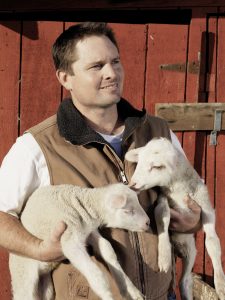 Callahan was just finishing college when a family friend visited from the Middle East. He noticed the sheep grazing on the slopes of Bellwether Farms’ hills and pointed out that where he came from, sheep were milked to make cheeses. That was when the Callahans realized that many of their favorite imported cheeses were, in fact, made from sheep milk. “That summer, we built the dairy, started milking the sheep and making cheese and going to farmers markets,” he said. That timing dovetailed with the growth of farmers markets and with the American food movement in general, and local chefs who had learned in Europe to go to farmers markets to find the freshest of local ingredients found Bellwether Farms cheeses at the farmers markets around San Francisco. “A lot of the value of these products is in explaining the story of how they’re made,” Callahan says. “Everything we’ve done has been because we were interested in it…. For the most part, the things we were interested in have aligned with the direction the market has gone.”
Callahan was just finishing college when a family friend visited from the Middle East. He noticed the sheep grazing on the slopes of Bellwether Farms’ hills and pointed out that where he came from, sheep were milked to make cheeses. That was when the Callahans realized that many of their favorite imported cheeses were, in fact, made from sheep milk. “That summer, we built the dairy, started milking the sheep and making cheese and going to farmers markets,” he said. That timing dovetailed with the growth of farmers markets and with the American food movement in general, and local chefs who had learned in Europe to go to farmers markets to find the freshest of local ingredients found Bellwether Farms cheeses at the farmers markets around San Francisco. “A lot of the value of these products is in explaining the story of how they’re made,” Callahan says. “Everything we’ve done has been because we were interested in it…. For the most part, the things we were interested in have aligned with the direction the market has gone.”
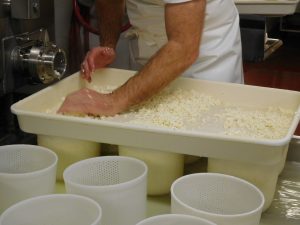 “I’m not doing anything, really, that hasn’t been done for centuries. But is it innovative to say, ‘I want to do it that way again?’” he adds. “The fact that this is done in a unique way resonates with a lot of consumers…. It’s more than cheese – there’s a history there. There’s a story there.”
“I’m not doing anything, really, that hasn’t been done for centuries. But is it innovative to say, ‘I want to do it that way again?’” he adds. “The fact that this is done in a unique way resonates with a lot of consumers…. It’s more than cheese – there’s a history there. There’s a story there.”
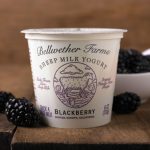 Today, Callahan makes highly regarded sheep milk yogurts and an array of award-winning cheeses from both his sheep milk and from cow milk purchased from local organic dairy farmers, and he’s planning the construction of a new creamery that should be finished in 2018 and that will expand his capacity with space for aging more cheeses and for giving him a little more elbow room around the cheese vats. He has recently been elected to the board of directors for the Dairy Sheep Association of North America, taking his place as a husbandman of sheep as well as the farm’s cheesemaker as his mother steps away from her herd management.
Today, Callahan makes highly regarded sheep milk yogurts and an array of award-winning cheeses from both his sheep milk and from cow milk purchased from local organic dairy farmers, and he’s planning the construction of a new creamery that should be finished in 2018 and that will expand his capacity with space for aging more cheeses and for giving him a little more elbow room around the cheese vats. He has recently been elected to the board of directors for the Dairy Sheep Association of North America, taking his place as a husbandman of sheep as well as the farm’s cheesemaker as his mother steps away from her herd management.
There’s been some controversy about the future of the sheep dairy industry in the U.S. after both Many Fold Farm and Barinaga Ranch ceased cheese production recently. Journalist Janet Fletcher discussed the reasons for that in a New York Times article in which she suggested that the American sheep dairy industry might be doomed by the economics of competing with European sheep milk cheeses. She noted that the cheeses produced by both Many Fold Farm and Barinaga Ranch were excellent cheeses, as evidenced by the many ribbons that their cheesemakers were taking home from competitions, but that wasn’t translating into profits for the farmsteads behind them.
Callahan believes, though, that despite these regrettable losses, there’s no immediate necessity for gloom about the future of the sheep dairy industry as a whole. “We really feel that we’re on the cusp of turning the corner, but I still feel there are a lot of reasons to be optimistic about what sheep milk has in the future,” he says. “The consumers respond to the milk and the products we make from it.”
He pointed out that recent nutrition research has shown that sheep milk has valuable health benefits, and the U.S. government has recently approved the importation of a limited supply of dairy sheep semen from France and that there are efforts under way to begin importing dairy sheep from Spain as well. “That’s a game-changer,” he says. Callahan plans to incorporate some of those genetics into his flock, which should result in lambs that will eventually grow into ewes that will produce more milk than do the ewes he has today. That should reduce his production costs for milk, and it will also make his lambs more valuable as potential breeding stock. All of that will give him a more solid economic base for his business. “We’re loving the sheep milk,” he says. “We’re just stuck on production…. Our ability to grow depends on our ability to use peak milk and put it in a cheese bank.”






